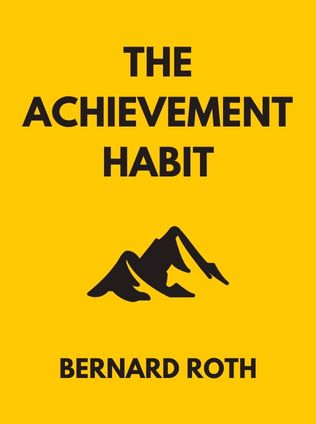
The Achievement Habit
Stop Wishing, Start Doing and Take Command of Your Life
By Bernard Roth
Published 07/2015
About the Author
Bernard Roth is a distinguished figure in the fields of engineering and design thinking. He holds the prestigious title of Rodney H. Adams Professor of Engineering and serves as the academic director of the Hasso Plattner Institute of Design at Stanford University, commonly known as the d.school. With his extensive background in kinematics—the science of motion—and as a pioneering force in robotics, Roth's contributions to his fields are immense. However, it is his innovative approach to design thinking and personal development that sets him apart. Roth has crafted courses that enable students to explore and tackle personal challenges, emphasizing the power of design thinking to transform one's life.
Main Idea
"The Achievement Habit: Stop Wishing, Start Doing and Take Command of Your Life" by Bernard Roth is a profound exploration of how design thinking principles can be applied to personal development and goal achievement. Roth argues that achievement is not an inherent trait but a muscle that can be developed. Through a blend of discussions, stories, recommendations, and exercises, Roth guides readers on a journey to overcome obstacles, develop self-confidence, and realize their full potential. He emphasizes the importance of doing rather than merely trying, shedding excuses, and redesigning one's self-image. Roth's insights encourage readers to take command of their lives and embrace the transformative power of design thinking.
Table of Contents
- Introduction
- Nothing Is What You Think It Is
- Reasons Are Bullshit
- Getting Unstuck
- Finding Assistance
- Doing Is Everything
- Watch Your Language
- Group Habits
- Self-Image by Design
- The Big Picture
- Make Achievement Your Habit
- Prototype Your Way to Success
- Be the Cause in the Matter
Introduction
In the introduction, Roth challenges readers to confront the real reasons behind their unfulfilled goals. He posits that most obstacles are self-imposed, a result of excuses and self-sabotage. Roth introduces the concept of using power rather than force, emphasizing that understanding one's behavior is crucial for transformation. This section sets the stage for the rest of the book by highlighting the difference between trying and doing, a theme that is elaborated upon throughout the chapters.
"Ask people to think about who stops them from accomplishing the things they want. It's always entertaining to listen to them explain how their parents, spouses, children, colleagues, bosses—you name it—prevent them from reaching their goals. These perceived obstacles are simply excuses; in almost every case, when you really dig down, it's you who are sabotaging yourself." - Bernard Roth
Nothing Is What You Think It Is
This chapter explores the subjective nature of meaning. Roth argues that objects, people, and circumstances have no inherent meaning; instead, the meaning is created by our perceptions. He suggests exercises to help readers recognize and alter these perceptions, empowering them to change their attitudes and behaviors.
- Practice looking at familiar objects and stating that they have no meaning to break habitual thinking.
- Relabel situations or behaviors to shift perspective, such as viewing job loss not as a personal failure but as an opportunity for growth.
"To forge a new attitude toward the events and relationships in your life, you must learn to look at them with a fresh perspective. Most people have a cognitive bias called functional fixedness that causes them to see objects only in their normal context." - Bernard Roth
Reasons Are Bullshit
Roth delves into the concept of reasons as excuses. He argues that reasons are often used to justify behavior and avoid taking full responsibility. By letting go of the need for reasons, individuals can adopt a more realistic self-image and make genuine progress towards their goals.
To illustrate:
- Recognize when you are using reasons as excuses.
- Adopt a mindset of responsibility, focusing on actions rather than justifications.
"The problem with reasons is that they're just excuses prettied up. Our society loves reasons. Perhaps the illusion that there is a single known reason for each thing we do is comforting." - Bernard Roth
Getting Unstuck
This chapter provides strategies for overcoming obstacles by changing one's thinking. Roth emphasizes the importance of asking the right questions and offers various techniques to generate solutions and shift perspectives.
Strategies include:
Sign up for FREE and get access to 1,400+ books summaries.
You May Also Like
The Subtle Art of Not Giving a F*ck
A Counterintuitive Approach to Living a Good Life
By Mark MansonRich Dad Poor Dad
What the Rich Teach Their Kids About Money - That the Poor and Middle Class Do Not!
By Robert T. KiyosakiHow To Win Friends and Influence People
The All-Time Classic Manual Of People Skills
By Dale CarnegieQuiet: The Power of Introverts
The Power of Introverts in a World That Can't Stop Talking
By Susan Cain



















